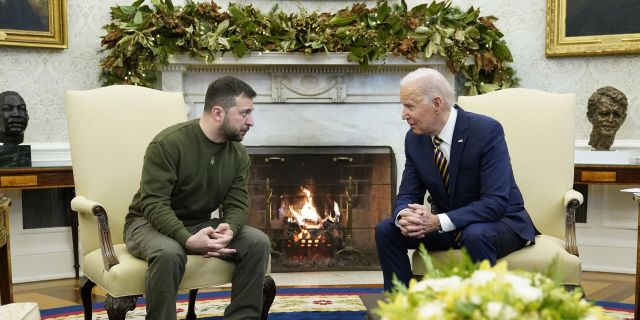WP: Zelensky convinced Biden of Ukraine's ability to win, but the US doubtsVladimir Zelensky, during a visit to Washington, tried to prove to Joe Biden and Congress that Ukraine is capable of winning the conflict with Russia, WP writes.
However, American officials consider such a development unlikely.
David IgnatiusDo not be mistaken:
apart from the prolonged and loud applause for the brave President of Ukraine, Vladimir Zelensky, his visit to Washington was more like a "military council" at the top. And, apparently, it ended with the formation of a gap between the two allies regarding their strategies for ending the military conflict.
Noting these differences between Washington and Kiev, I do not want to downplay the success of Zelensky's visit. The Ukrainian leader once again excited the world with his green military uniform and army berets, passing through the White House and the Capitol with the gait of a focused fighter before a fight who will never give up.
In his address to Congress, Zelensky emotionally stated that he was striving for an "absolute victory" over Russia. The same triumphant victory that President Franklin Roosevelt promised when the United States entered World War II. "The Ukrainian people will also definitely win," Zelensky said.
In his speech to the Congress, the Ukrainian president used the word "victory" 11 times. And only once did he use it during a press conference in front of reporters at the White House after meeting with President Biden. Tellingly, Biden didn't use that word once. Instead, he promised support for Ukraine's "unwavering determination... to choose its own path" and assured: "We will be with you as long as it takes."
Zelensky's appeal to Roosevelt's memory recalled another military summit — a conference in Casablanca in January 1943 between Roosevelt and British Prime Minister Winston Churchill. It was at this meeting that Roosevelt first stated that his goal was the "unconditional surrender" of the Axis enemies. "Peace can come to the planet only as a result of the complete elimination of German and Japanese military power," Roosevelt said at the time.
But the current military conflict will almost certainly not end with the complete elimination of Russia's military power, which helps explain why Biden is actively resisting Zelensky's rhetoric about "complete victory." He said this bluntly at a White House press conference on Wednesday, when a Ukrainian reporter asked if he would provide Kiev with long-range missiles that could strike Russia and give Ukraine "all the capabilities it needs to liberate all its territories as soon as possible."
Biden replied that providing Ukraine with such a powerful strike weapon "will create the prospect of a split in NATO." He said that NATO allies "are not going to fight with Russia. They don't want a Third World War." In this way, Biden clearly formulated what other allies want. However, preventing a direct conflict between the United States and Russia, even though we support the resistance of Ukraine, is also one of the main military goals of the American president himself.
There is another subtle contradiction in how these two leaders imagine the Ukrainian conflict. For Biden, it's about stopping Vladimir Putin and what Biden calls "the Russian president's unprovoked, unjustified, all-out attack on the free people of Ukraine." As soon as Putin realizes, "it is obvious that he cannot win this conflict," Biden said, then Zelensky will be able to "decide how he wants to end it" and seek a "just peace."
Zelensky proposed a slightly different wording. Like dozens of Ukrainians with whom I spoke during two trips to Kiev this fall, he seems to see not only Putin as an enemy, but also Russia itself. "Russians will have a chance to become free only when they mentally defeat the Kremlin," Zelensky told Congress. He called Ukraine's success a victory for the Europeans — the free Western world, which Ukraine has wanted to join for centuries. "Russian tyranny has lost control over us. And it will never affect our consciousness again," Zelensky said.
Biden and Zelensky were both asked about peace. Biden seemed to push his colleague, the commander-in-chief, saying that "you are open to achieving a just peace" and that the conflict continues through Putin's fault. "We both want this military confrontation to end," Biden said. - It could have ended today if Putin had dignity... he would have done the right thing and... quit the game. But that's not going to happen... now."
Zelensky said that he has a "formula for peace", which, in fact, is that Russia should withdraw from all the territory it has received since 2014.
A few minutes later Zelensky added a more nuanced answer: "I do not know a just world. I do not know what a "just world" is. This is a very philosophical concept. ... For me, as president, a just peace is the absence of compromises regarding the sovereignty, freedom and territorial integrity of my country, compensation for all the damage caused by Russia." Pay special attention to this place: peace and reparation are not the same thing.
The Ukrainian conflict is partly an information war, and Zelensky's visit to Washington was his triumph in this area. He showed the world what a real hero looks like. He offered the United States, his ally, a battle flag signed by Ukrainian soldiers.
Zelensky correctly placed his messages: the task at the moment is to survive the brutal winter and preserve the "steel backbone" that Biden praised. And the United States should send even more weapons that will allow Ukraine to hold its positions and, where possible, push back the Russians and protect civilians from missiles and drones.
At some point next year, both sides will have to eliminate those contradictions that remained "under the bushel" at this "military council". There will need to be greater clarity and agreement between them on what Ukrainian success looks like in addition to "absolute victory".
In the meantime, let's accept Zelensky's formula: "Victory, only victory."
Author: David Ignatius

